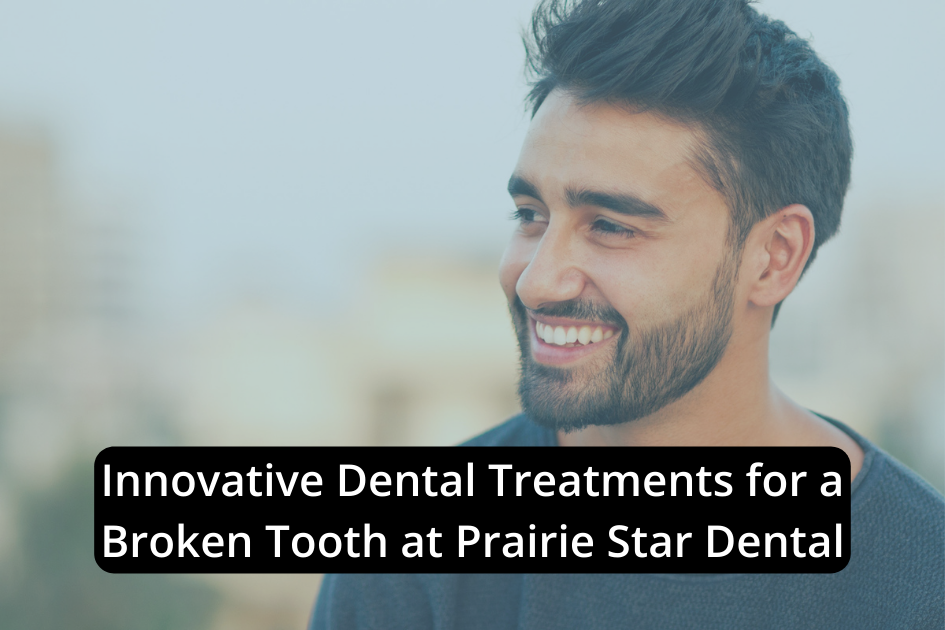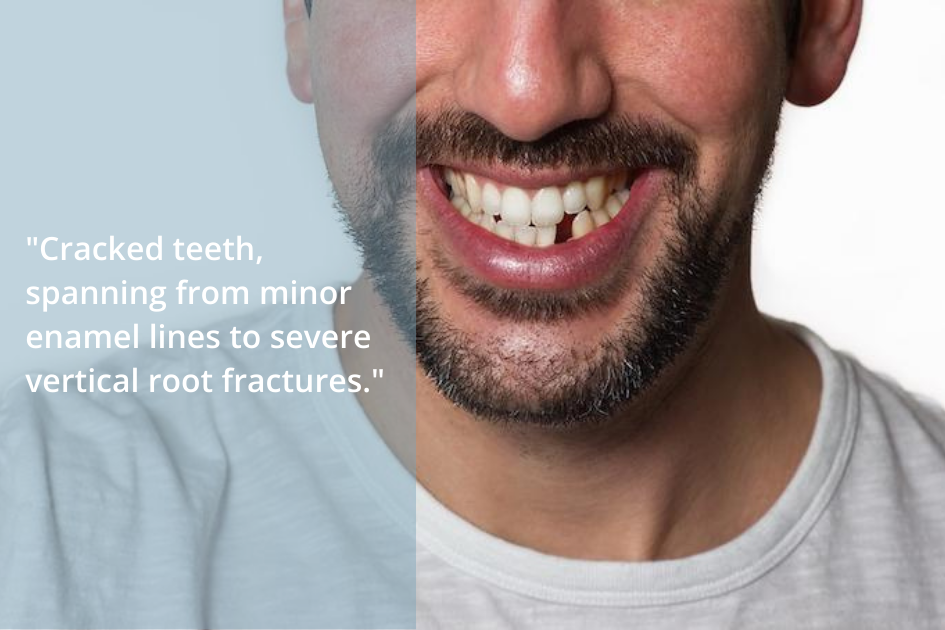
As we explore common dental problems, a cracked tooth inevitably surfaces. It’s an issue known for causing significant discomfort and inconvenience. However, solutions exist. Ranging from dental implants to crowns and fillings, numerous methods can help restore oral health and your smile.
Understanding Cracked Teeth
Cracked teeth, spanning from minor enamel lines to severe vertical root fractures, are prevalent dental problems resulting from factors such as chewing on hard items, teeth grinding, or accidental injuries. The severity of these causes can differ and subsequently, necessitate different therapeutic methodologies.
There are four primary kinds of cracked teeth: fractured cusps, cracked teeth, split teeth, and vertical root fractures. Fractured cusps generally occur surrounding a filling and induce minor discomfort. Cracked teeth, however, are characterized by a crack line extending from the chewing surface downwards towards the root. Conversely, split teeth typically emerge as a consequence of an untreated cracked tooth. Vertical root fractures are cracks initiating in the root and extending towards the chewing surface, often producing minimal symptoms but inflicting significant damage.
Treatment methodologies are determined based on the size, location, and depth of the crack. Procedures such as bonding, dental crowns, root canal therapy, or even extraction might be required. Recognizing the causes of cracked teeth is pivotal for determining suitable treatment and averting further dental damage. The significance of seeking expert dental advice for precise diagnosis and treatment can’t be emphasized enough.
Immediate Actions for a Cracked Tooth
When confronted with a cracked tooth, immediate and appropriate action is critical to prevent further complications. Swift measures can lessen pain, curb swelling, and set the stage for successful dental restorations. Let’s discuss the essential steps to follow after suffering a tooth crack.
The Importance of Prompt Action
Recognizing the necessity for swift action when faced with a cracked tooth is crucial. We can’t stress enough the urgency of obtaining professional dental care without delay to ward off additional harm, infection, and avoidable discomfort.
- Halt to further damage: A quick reaction hinders the crack’s advancement, protecting the rest of the tooth.
- Control of infection: Immediate dental attention reduces the chances of bacteria invading the tooth, which could lead to a painful infection.
- Reduced discomfort: Addressing the problem promptly aids in minimizing pain and discomfort, improving your overall well-being.
- Successful treatment: Swift action enhances the chances of successful treatment and restoration, providing comprehensive dental resolutions.
Professional Dental Solutions for a Cracked Tooth
We now focus on the expert dental treatments available for a cracked tooth. These techniques can aid in restoring your tooth’s natural function and aesthetic, while also offering protection against further harm.
Dental Bonding
Within the field of restorative dentistry, dental bonding stands out as a cost-efficient technique to mend a cracked tooth. A composite resin material, tailor-made to bond to your tooth, offers a swift solution for minor cracks.
There are four main aspects to understand about dental bonding:
- Dental bonding is an economical procedure that involves applying a composite resin to the damaged tooth.
- The process is expedited with a dental light, making it an immediate solution for minor cracks.
- Although other options might be more durable for molars, bonding is useful for repairing minor cracks on visible teeth, which improves aesthetics.
- Its popularity is due to its capability to deliver natural-looking results in a short period.
Dental Crowns

Dental bonding may provide a temporary solution for minor cracks, but for more severe cracks or decay, the use of dental crowns is often suggested. These are bespoke caps, typically constructed from robust materials such as metal, porcelain, or ceramic, that cover the whole damaged part of a cracked tooth, offering optimal protection and strength.
Dental crowns can provide a durable restoration, typically lasting beyond ten years with correct care. They’re especially suitable for molars and premolars and are tailored to fit your tooth impeccably, enhancing overall function and integrity. Consequently, if you’re in search of a dependable solution for a cracked tooth, consider that a dental crown not only maintains the tooth’s integrity but also helps prevent any future damage.
Root Canal Therapy
Root canal therapy is another potent dental remedy for cracked teeth, focusing on and addressing infections in the tooth pulp. Such treatment plays a crucial role in maintaining the natural tooth structure and averting the need for extraction.
Root canal therapy boasts a high success rate in restoring cracked teeth and relieving related pain. It’s an established, trustworthy professional dental solution.
Porcelain Veneers
Porcelain veneers offer a sturdy remedy for individuals suffering from severely cracked front teeth. These custom-made colored shells repair the damage while also improving the aesthetics of your smile. Made from top-quality porcelain, these veneers are durable and provide a long-lasting fix for cracked teeth.
Beyond addressing dental problems, veneers also solve cosmetic issues, enhancing the look of your smile. We ensure these veneers are professionally placed for a perfect fit, further improving the overall smile. With the right care, these natural-looking restorations can last for more than ten years.
Tooth Extraction
While porcelain veneers can be an effective solution for some dental issues, there may be instances where a tooth is so severely cracked that it’s irreparable, necessitating an extraction. This is the final option when the crack goes beneath the gum line, threatening the integrity of the tooth, and other therapies are no longer feasible.
Here’s a simple explanation of the procedure:
- The area is numbed to lessen discomfort.
- The damaged tooth is gently loosened and extracted to avoid causing more harm.
- Following extraction, we’ll explore different replacement options to ensure oral health remains intact.
- Post-procedure care is vital to avoid infection and encourage healing.
Dental Implants
When a tooth becomes severely damaged and irreparable, dental implants offer a reliable and lasting remedy. This involves a surgical procedure where a titanium screw is inserted into the jawbone, serving as a new root, and offering a secure base for the implant. Over a period of time, this titanium screw integrates with the jawbone, forming a solid anchor.
In situations where the jawbone lacks the necessary density, it may be necessary to carry out bone grafts to guarantee a safe anchorage. An abutment is attached to the implanted screw, which supports the final crown or replacement tooth.
Dental implants are more than just a long-term solution for damaged teeth. They also replicate the natural appearance and functionality of your teeth, restoring your self-assured smile.
Prevention Tips to Avoid Future Cracks

If you want to avoid future cracks in your teeth, adopting these five preventative measures can be beneficial.
- Steer clear of hard objects: Chewing on items such as ice, pens, or hard candies may cause a tooth to crack. It’s advisable to consume softer foods and utilize tools instead of your teeth to open packages.
- Use a mouthguard: Remember to protect your teeth while engaging in sports. A quality mouthguard can safeguard against damage from unexpected blows.
- Practice good oral hygiene: Regular tooth brushing and flossing help maintain strong and healthy teeth, thus reducing the likelihood of cracks.
- Schedule regular dental check-ups: Frequent dental check-ups and cleanings enable your dentist to spot and tackle any early indications of cracks. They can also suggest dental procedures, such as dental crowns, to fortify your teeth.
- Think about using a nightguard: If you have a habit of grinding or clenching your teeth during sleep, a nightguard can help prevent cracks caused by pressure.
While these prevention tips might appear basic, they play a significant role in preserving your oral health. It’s worth noting that preventing a cracked tooth is simpler than repairing one.
Conclusion
We trust this guide has clarified practical approaches to address a cracked tooth. It’s imperative to respond promptly and consult a dental professional to avert additional harm.
With advancements in restorative dentistry, confronting this problem can be done with confidence. Selecting the appropriate dentist is also crucial.
Let’s keep our oral health at the forefront, ward off future dental issues, and restore our dazzling smiles. We can transform dental obstacles into triumphant wins. Now, take control of your oral health. Schedule a dental check-up with Prairie Star Dental in Round Rock, TX today!


